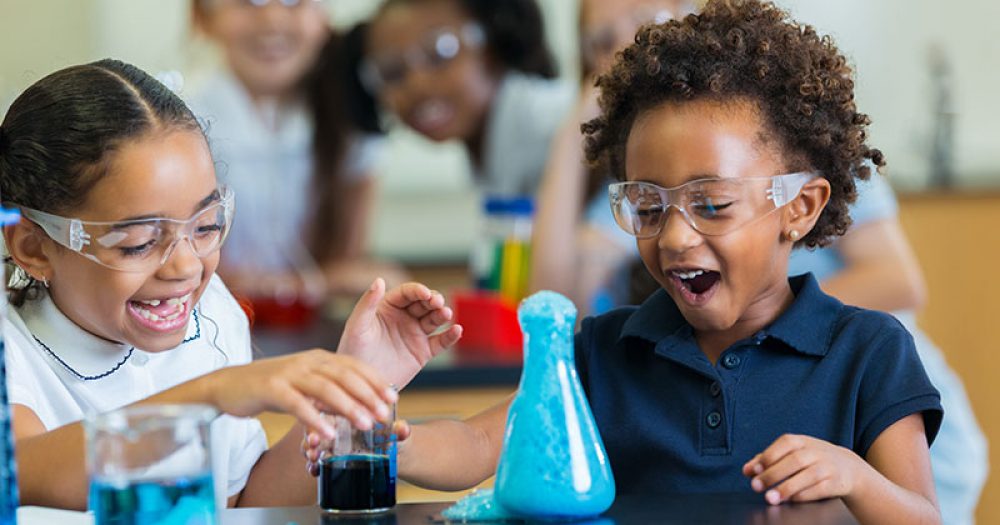Do pupils learn more science when they’re taught in classrooms – with the teacher explaining concepts – or in labs, through pupil experimentation? Phil Naylor takes a look at what the research says, and shares some tips for effective science teaching
“Are we doing a practical, sir?” screams the excited year 9 down the corridor, as they realise that we’ve had a room change. “Love practicals, sir!”
While this is a familiar scenario for many science teachers, there is a running debate in the profession as to the value of practical work. When I began teaching in 1950s and ‘60s buildings, the science departments were often kitted out with enough labs for every teacher, and most lessons contained an element of practical.
With the advent of modular exams and Building Schools for the Future, we saw a reduction in the number of labs, and science lessons taught in classrooms are on the increase.
But what does the evidence say?
The state of the debate was best summed up in 1998, in the essay Science education without a laboratory? , where the author suggests that practical work “only has a strictly limited role to play in learning science and that much of it is of little educational value”.
What the research says, in a nutshell, is that the simple fact of doing practical work in science does not mean students will necessarily be learning.
The evidence is very clear, however, that pupils like and are engaged by practical work. Wellcome Science Education tracker recently asked 4081 students aged 14-18 the reason why they enjoyed science at school and the leading factor was practical work.
This isn’t too surprising. But enjoyment on its own is obviously insufficient reason – to justify practical work in science, it also needs to have value for learning.
Reasons why it might be good for learning include: it develops a mindset of scientific enquiry, which in turn, can lead to greater engagement; and (this is the crucial part…) when done well, experiments can solidify student understanding.
With this in mind, here are some pointers to good practical science:
1. Establish why you are doing a practical
The Gatsby Good Practical Science report states that “teachers should have a clear purpose for every practical activity and how it relates to what they are teaching”. This means eliminating practicals for practicals’ sake, and having very clear, tight outcomes for students. Some of this has been facilitated by recent changes to KS4 curriculum in the form of Required Practical Activities.
Here are some further examples from the Gatsby report, on what makes good practical work:
- Confirmatory experiments, in which students do an experiment designed to confirm or apply a theory they have already met.
- Experiments to derive theories, in which students carry out experiments designed to reveal a theory.
- Technique development, in which students learn or develop a particular scientific technique.
- Observation activities, in which students practice scientific observation.
- Investigations, in which students design an experiment to test a given question, carry it out and interpret the results, all within a fixed time period.
- Projects, in which students think of a question, design an experiment to test it, carry it out and interpret the results, within an extended time period.
2. Fewer videos and use of virtual experiments
With the easy access to numerous practicals on YouTube, it is tempting to use video. Companies like Apple have moved into virtual experiments, particularly around dissections. However, I would recommend real-life practicals wherever possible – pupils spend too much time in the virtual world and it is important for science teachers to bring science to life.
3. Deploy experts where required
According to Gatsby, “Teachers with subject-specific qualifications are likely to be more experienced and confident in working with materials and equipment involved in their subjects and to explain the underlying theory”.
I would agree with Gatsby recommendations that science departments audit their expertise on an annual basis. Following this, they should both source and supply high quality, subject-specific CPD to include practical work.
4. More practical in primary
Science has all but disappeared from primary schools, with the focus on literacy and numeracy. With the development of MATs and all-through schools, there are both the capacity and the resources to do more practical and investigative work at key stages 1 and 2. Timetables can be creative on the use of ‘double lessons’, or alter lesson length to facilitate more practical lessons at key stages 3 and 4, and this can lead to students experiencing a more varied and balanced science curriculum.
So, as you are submitting your requisition sheet for this term, have a think about practicals. Why are we doing them and how we can deliver them best to improve outcomes for our students?
Phil Naylor is Assistant Director at the Blackpool Research School. The EEF guidance report on science teaching is due for publication this September.








Your thoughts